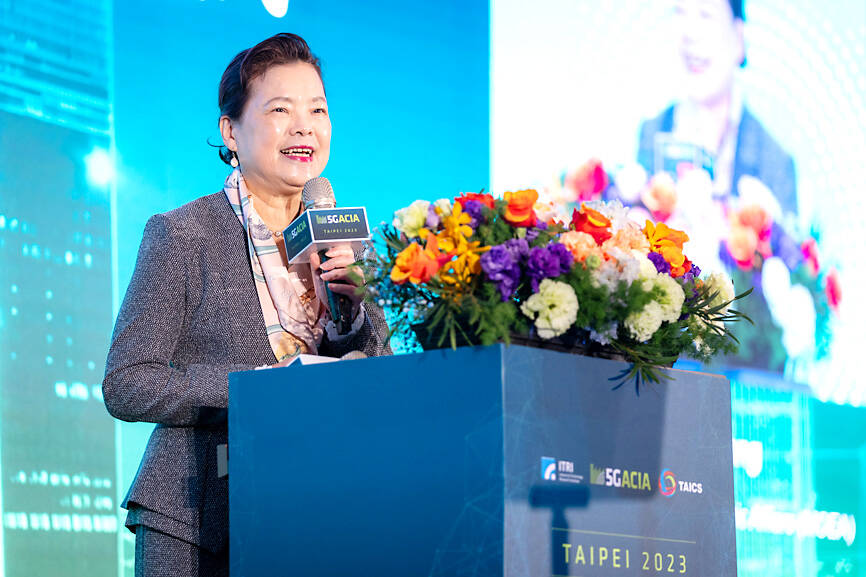A new list of core technologies, including semiconductor process technologies, that are subject to tighter controls is not likely to affect Taiwanese vendors, Minister of Economic Affairs Wang Mei-hua (王美花) said yesterday.
Speaking to reporters on the sidelines of a ceremony where an agreement was signed on the formation of a 5G alliance in Taiwan, Wang said that the government had discussions with local chipmakers before the list was released.
“I do not think the controls will have any negative impact on Taiwanese semiconductor suppliers,” Wang said. “Instead, the controls aim to protect [Taiwan-developed] critical technologies.”

Photo courtesy of Ministry of Economic Affairs
On Tuesday, the National Science and Technology Council announced a set of 22 technologies subject to tight controls in five major areas: defense, aerospace, agriculture, semiconductors, and information and communications technology.
The 22 technologies include 14-nanometer and more advanced chipmaking process technologies and advanced IC packaging and testing technologies, including processes involving silicon photonics integration development and related specialty raw materials and equipment.
The National Security Act (國家安全法) stipulates that people who steal key technologies and leak them to China, Macau, Hong Kong or external hostile forces may be imprisoned for up to 12 years and fined up to two times the profit they garner.
Wang also cited the Act Governing Relations Between the People of the Taiwan Area and the Mainland Area (台灣地區與大陸地區人民關係條例), which states that companies that receive subsidies equal to more than 50 percent of their costs in developing critical technologies should secure approval before sending employees to China.
Industrial Development Administration Director-General Lien Ching-chang (連錦漳) on Tuesday said that Taiwan Semiconductor Manufacturing Co (TSMC, 台積電) is unlikely to be negatively affected by the technology controls.
TSMC deploys technologies in Taiwan that are more advanced than 14-nanometer processes, while in China it uses 14-to-16-nanometer processes, which account for 10 to 12 percent of its total sales.
“I don’t expect TSMC to be bothered by the newly announced technology controls,” Lien said, adding that the controls on 14-nanometer or more advanced processes were in line with international standards, referring to the US.
Taiwan accounts for more than 70 percent of global production of 14-nanometer and more advanced chips.
Smaller contract chipmaker United Microelectronics Corp (UMC, 聯電) said it would follow the new tech controls, adding that 14-nanometer process technology deployment is limited to Taiwan, while it uses 22 and 28-nanometer processes in China.
Taiwan Institute of Economics Research researcher Arisa Liu (劉佩真) said the government’s move to tighten controls on critical technologies is needed, as Taiwan not only has to build a local semiconductor supply chain, but also must prevent leaks, in particular at a time when China is keen to poach Taiwanese engineers.

RUN IT BACK: A succesful first project working with hyperscalers to design chips encouraged MediaTek to start a second project, aiming to hit stride in 2028 MediaTek Inc (聯發科), the world’s biggest smartphone chip supplier, yesterday said it is engaging a second hyperscaler to help design artificial intelligence (AI) accelerators used in data centers following a similar project expected to generate revenue streams soon. The first AI accelerator project is to bring in US$1 billion revenue next year and several billion US dollars more in 2027, MediaTek chief executive officer Rick Tsai (蔡力行) told a virtual investor conference yesterday. The second AI accelerator project is expected to contribute to revenue beginning in 2028, Tsai said. MediaTek yesterday raised its revenue forecast for the global AI accelerator used

TEMPORARY TRUCE: China has made concessions to ease rare earth trade controls, among others, while Washington holds fire on a 100% tariff on all Chinese goods China is effectively suspending implementation of additional export controls on rare earth metals and terminating investigations targeting US companies in the semiconductor supply chain, the White House announced. The White House on Saturday issued a fact sheet outlining some details of the trade pact agreed to earlier in the week by US President Donald Trump and Chinese President Xi Jinping (習近平) that aimed to ease tensions between the world’s two largest economies. Under the deal, China is to issue general licenses valid for exports of rare earths, gallium, germanium, antimony and graphite “for the benefit of US end users and their suppliers

Dutch chipmaker Nexperia BV’s China unit yesterday said that it had established sufficient inventories of finished goods and works-in-progress, and that its supply chain remained secure and stable after its parent halted wafer supplies. The Dutch company suspended supplies of wafers to its Chinese assembly plant a week ago, calling it “a direct consequence of the local management’s recent failure to comply with the agreed contractual payment terms,” Reuters reported on Friday last week. Its China unit called Nexperia’s suspension “unilateral” and “extremely irresponsible,” adding that the Dutch parent’s claim about contractual payment was “misleading and highly deceptive,” according to a statement

Artificial intelligence (AI) giant Nvidia Corp’s most advanced chips would be reserved for US companies and kept out of China and other countries, US President Donald Trump said. During an interview that aired on Sunday on CBS’ 60 Minutes program and in comments to reporters aboard Air Force One, Trump said only US customers should have access to the top-end Blackwell chips offered by Nvidia, the world’s most valuable company by market capitalization. “The most advanced, we will not let anybody have them other than the United States,” he told CBS, echoing remarks made earlier to reporters as he returned to Washington